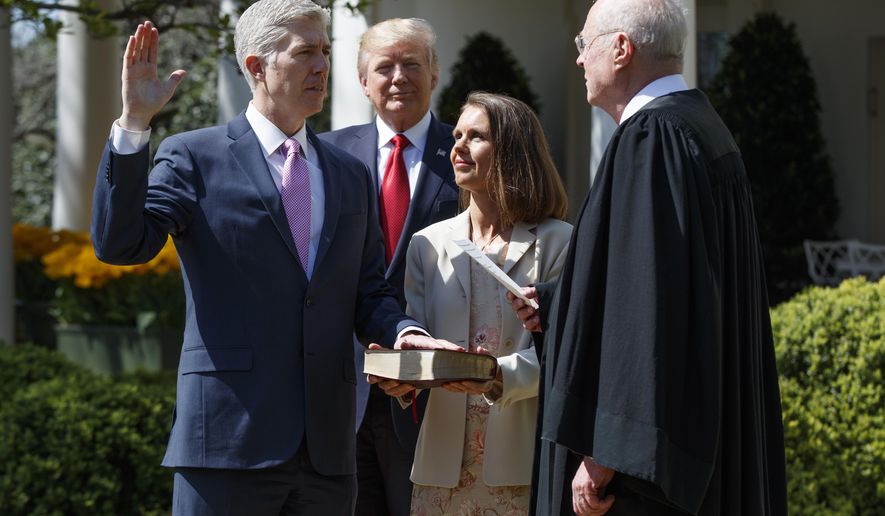The Supreme Court still has 13 cases it will hear this term, including a significant religious liberty case looming next week. This gives newly minted Justice Neil Gorsuch a chance to make his mark.
Justice Gorsuch, who was sworn in Monday, can also weigh in on any cases where the court has already heard arguments but is facing a 4-4 tie. Ties on the Supreme Court leave the lower court’s ruling intact.
And he can begin shaping the court’s caseload, providing yet another vote for which cases the justices will hear. Four justices must vote to consider a case for it to be granted certiorari, or “cert,” as court-watchers have come to label the high court’s grant of a hearing.
“He’s never had the opportunity to rule on something like cert in the past, so I don’t really know what his philosophy will be on that,” said Carrie Severino, chief counsel at the conservative Judicial Crisis Network.
Justice Gorsuch had been a circuit appeals judge for the last decade, where he generally had to hear all cases assigned to him. But the Supreme Court is selective about its docket.
The biggest case still looming involves Trinity Lutheran Church in Missouri, which had sought money to renovate its playground from a state program designed to improve park safety for children.
The state’s Department of Natural Resources (DNR), and later the federal courts, ruled that allowing the church to collect grant money would be in violation of the state’s constitution.
Trinity Lutheran has appealed, arguing that the money isn’t just helping the church but rather all members of the broader community who use the playground.
Alliance Defending Freedom (ADF), a religious liberty law firm that’s representing the church, said Missouri is trying to treat the church as second-class citizens by excluding it from a program open to all non-religious playgrounds.
“We’re hopeful that Justice Gorsuch will understand that and see the significance of it,” said ADF senior counsel Erik Stanley.
While on the Tenth Circuit Court of Appeals, Justice Gorsuch ruled on a number of cases concerning religious liberty, often issuing rulings that protected the religious practitioners.
Dan Goldberg, legal director at the progressive Alliance for Justice, said that given Judge Gorsuch’s views on religion and his record while on the lower court, it’s potentially “very troubling” the impact his vote could have in this case.
Hannah Smith, an attorney with the Becket Fund, told The Washington Times that the Trinity Lutheran case is significant because the last time the court considered a similar kind of question dealing with the Free Exercise Clause was more than 10 years ago.
“The court’s composition has changed significantly since then, so I think it will be interesting to see how the current court grapples with this question,” she said. “I think it will be a close case.”
As for cert petitions, court-watchers wonder whether Justice Gorsuch will make the difference in a Colorado case involving a baker who refused to decorate a cake for a same-sex wedding, citing religious beliefs.
“As it currently stands, most court watchers think it’s likely that a justice is writing a dissent from denial of cert,” said Ms. Smith. “But if Justice Gorsuch were indeed the fourth vote in favor of a grant, then the case could be granted.”
Other petitions to the high court include gun and voting rights.
Curt Levey, president at the Committee for Justice, said he would like to see the court consider the Second Amendment issue now that Justice Gorsuch fills out the court at nine justices.
“He’s probably on the conservative side of the Second Amendment cases,” Mr. Levey said.
• Alex Swoyer can be reached at aswoyer@washingtontimes.com.




Please read our comment policy before commenting.